
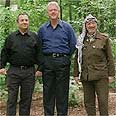
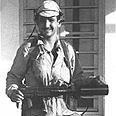
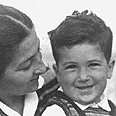
Born in Kibbutz Mishmar HaSharon in 1942, the eldest of four children. His parents, Esther and Yisrael Brog immigrated to Israel in the early 1930s and were part of the generation that founded the kibbutz.
Named after a biblical judge, the young Barak excelled as a pianist and spent his free time dismantling watches and locks. He failed to graduate from high school after being expelled during his senior year. He eventually took his finals during his military service.
Barak received a BSc in mathematics and physics from the Hebrew University in Jerusalem and a masters in economic engineering systems from Stanford University in California.
Barak is divorced and has three children. He lives in central Tel Aviv with his second wife, Nili Priel.
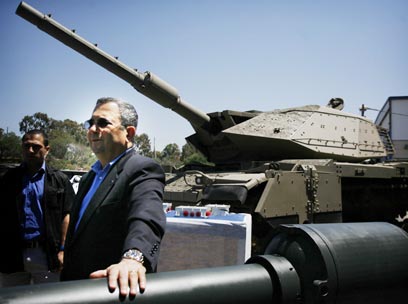
A veteran of military service (Photo: Tomer Appelbaum)
Military Service
Barak enjoyed an illustrious 36-year career in the Israeli Defense Forces and left as its most decorated soldier, with five commendations for bravery and excellence in battle.Drafted in 1959 Barak volunteered for the elite Matkal reconnaissance unit and by 1971 was appointed its commander. During his tenure the unit monopolized Israel's special operations and had become its foremost authority on counter-terrorism. High-profile operations led by Barak include the rescue of Israeli hostages from a hijacked Sabena flight in Operation Isotope (1972) and the targeting of PLO leaders in Lebanon after the massacre at the Munich Olympics in Operation Spring of Youth (1973).
He was also a key architect of the 1976 Entebbe Operation that rescued passengers on an Air France aircraft hijacked by Palestinian terrorists and forced to land at Entebbe Airport in Uganda.
Barak, nicknamed 'Napoleon' by his army buddies, continued his meteoric rise through the IDF ranks, serving as head of military intelligence, head of the Central Command and as deputy chief of staff. In 1991 he was appointed chief of staff.
As chief of staff, Barak oversaw the redeployment of the IDF in Gaza and Jericho as part of the Oslo Accords.
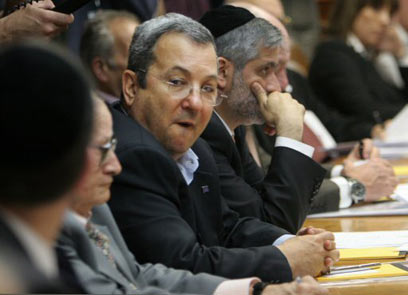
The statesman (Photo: AFP)
Political Career
In January 1995 Barak was discharged from the IDF and opened an investment firm in Washington. Six months later, at the personal request of then-premier Yitzhak Rabin, he returned to Israel to join the political arena and was appointed minister of internal affairs.After Rabin's assassination in November 1995, Barak was appointed minister of foreign affairs in Shimon Peres' short-lived interim government. In the subsequent 1996 elections Barak joined the Labor party as an elected MK and in 1997 he succeeded Peres as party chairman and opposition leader.
In 1999 Barak defeated sitting-Prime Minister Benjamin Netanyahu and took office as both prime minister and minister of defense.
In May 2000 Barak led a unilateral withdrawal of all Israeli forces from southern Lebanon, ending an 18-year military presence in the region.
As prime minister, Barak sought to reach a final conclusive peace agreement with the Palestinian Authority, an attempt that culminated in the 2000 Camp David summit. The attempt failed however and the al-Aqsa intifada erupted later that year.
The events and Israel's response to them dealt a devastating blow to Barak's political standing. With his coalition in tatters, Barak was eventually forced to resign in 2001. That same year he lost the premiership to veteran politician Ariel Sharon who ran on a Likud ticket.
Having resigned from the Knesset following his defeat, Barak enjoyed immense success as businessman and served as a consultant for several local and international companies. A highly sought-after public speaker, he also joined the lecture circuit abroad.
In November 2004 Barak announced his return to political life and declared his intention to vie for the Labor chairmanship once more. However low polling figures early in the race led him to withdraw his candidacy and endorse Shimon Peres.
On the heels of the Second Lebanon War in 2006 the public seemed to once again crave political leaders with vast military experience and following a steady, measured return to public prominence Barak announced in January 2007 he would run in the Labor primary elections.
Pitted against former Shin Bet Chief Ami Ayalon, Barak eventually won the election in the second round of voting in June. Almost immediately he replaced the ousted Amir Peretz as minister of defense in Ehud Olmert's government.
In the 2009 elections, the Labor Party dropped to 13 Knesset seats.
In a shocking move in early 2011, Barak announced that he was quitting the Labor Party and launching his own faction - the Independence faction. Barak remained defense minister as part of Benjamin Netanyahu's second government, but retired from politics when Israel's 33rd government was established.














